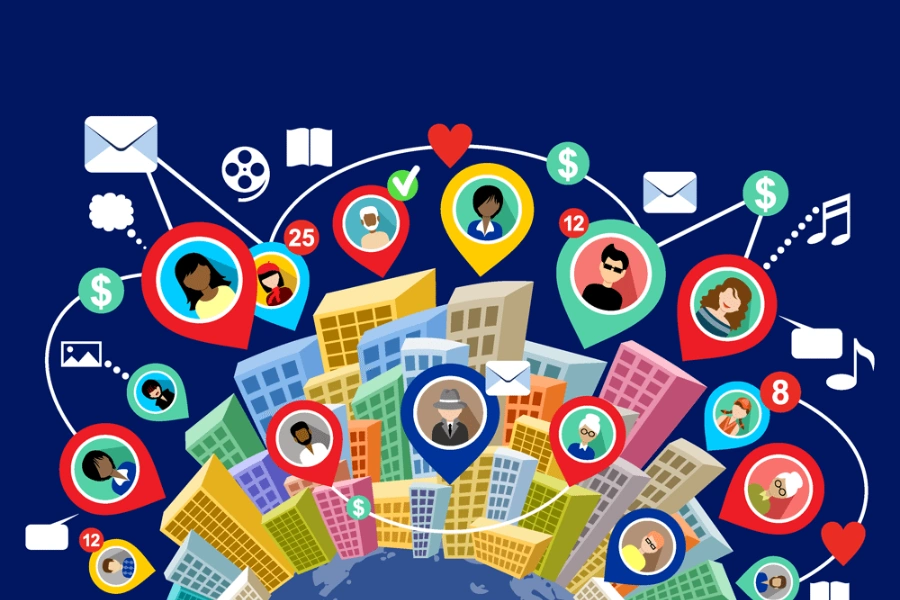Social networks have become a big part of our lives, especially for young people. These platforms let us connect with friends, share our thoughts, and learn new things. But just like anything else, social networks have their good and bad sides. In this blog, we will explore the advantages and disadvantages of social networks, helping you understand how they impact our daily lives.
Definition of Social Networks
Social networks are online platforms that allow people to connect and communicate with each other. They let users create profiles, share pictures and videos, send messages, and join groups with similar interests. Some of the most popular social networks include Facebook, Instagram, Twitter, and TikTok. These platforms have changed the way we interact with others, making communication faster and easier.
Advantages of Social Networks
Enhanced communication and connectivity
One of the biggest advantages of social networks is how they make communication easier. With just a few clicks, you can send a message to a friend who lives far away or video chat with family members. Social networks keep us connected with people, no matter where they are in the world. This instant communication is something that was not possible before the emergence of social networks.
Access to Information and News
Social networks are a great way to stay updated with what's happening around the world. Many people use these platforms to read news articles, watch videos, and learn about current events. The advantages of social networks include easy access to information, but it's important to be careful about the sources you trust.
Opportunities for Networking
Social networks are not just for fun—they can also help with your future. These platforms allow you to connect with people who have similar interests or work in the same field. This is called networking, and it can lead to job opportunities or new friendships. Social networks are especially useful for professionals who want to expand their connections.
Platforms for Self-Expression
Social networks provide a space for people to express themselves. Whether it's sharing artwork, writing, or even funny videos, these platforms let users show their creativity to the world. This self-expression can be a positive way to share your thoughts and talents with others.
Support for Mental Health

Another advantage of social networks is the support they can provide for mental health. Many people find comfort in joining groups where they can talk about their feelings or challenges. These groups offer support and advice from others who may be going through similar experiences. Social networks can help people feel less alone in their struggles.
Business Promotion and Marketing
Social networks are also important for businesses. Companies use these platforms to reach their customers, share updates, and promote their products. This is known as digital marketing, and it can be very effective in reaching a large audience. For example, Social Media Marketing in Zürich or Social Media Marketing in Switzerland can help local businesses grow.
Collaboration and idea sharing
Social networks allow people to work together on projects and share ideas. This collaboration can happen in groups or forums where users discuss different topics. It's a great way to learn from others and contribute your own thoughts.
Disadvantages of social networks
Privacy and Security Concerns
While social networks connect us with others, they also raise concerns about privacy and security. Personal information shared online can sometimes be accessed by people who shouldn't have it. This can lead to identity theft or other security issues. The disadvantages of social networks include the need to be cautious about what you share online.
Cyberbullying and Harassment Issues
One of the major disadvantages of social networks is cyberbullying. This happens when people use social media to send hurtful messages or spread rumors. Cyberbullying can cause serious emotional pain and is a big problem on social networks.
Addiction and Time Consumption
Social networks can be addictive. Many people spend hours scrolling through their feeds, which can take time away from other important activities like studying or exercising. This addiction is one of the disadvantages of social networks that can negatively impact your daily life.
Misinformation and Fake News
Not everything you see on social networks is true. Sometimes, false information or fake news is spread, which can mislead people. It's important to always check the facts and not believe everything you read online. This is a key part of understanding the advantages and disadvantages of social networks.
Negative Impact on Relationships

Spending too much time on social networks can affect your relationships with family and friends. If you're always on your phone, you might miss out on real-life interactions. This can lead to feelings of isolation and harm your relationships.
Impact of Social Networks on Communication Style
The emergence of social networks has changed the way we communicate. People now use shorter messages, emojis, and abbreviations more often. While this can make communication faster, it can also lead to misunderstandings. It's important to balance online communication with face-to-face interactions.
Emergence of Social Networks
The emergence of social networks has transformed how we interact with the world. From staying connected with loved ones to promoting businesses through digital marketing, social networks have become a central part of our lives. However, it's crucial to be aware of both the advantages and disadvantages of social networks and use them wisely. Furthermore, you should think about hiring an expert digital marketing agency in Switzerland for the success of your business.
Conclusion
Social networks have many benefits, like keeping us connected and providing platforms for self-expression and business promotion. However, they also come with challenges such as privacy issues, cyberbullying, and the spread of misinformation. Understanding the advantages and disadvantages of social networks helps us use these tools in a way that enhances our lives while minimizing the risks.
FAQs
What are social networks?
Social networks are online platforms where people can connect, communicate, and share content like photos, videos, and messages. Popular examples include Facebook, Instagram, and Twitter. They allow users to stay in touch with friends, join communities, and access news and information.
What are the main advantages of social networks?
The main advantages of social networks include enhanced communication, easy access to information, networking opportunities, self-expression, mental health support, and business promotion. These platforms help people stay connected and offer various benefits for both personal and professional growth.
What are the disadvantages of social networks?
Some disadvantages of social networks are privacy concerns, cyberbullying, addiction, misinformation, and negative impacts on relationships. While social networks have many benefits, users should be aware of these challenges and take steps to protect themselves online.
How do social networks affect communication?
Social networks have changed communication by making it faster and more informal. People often use short messages, emojis, and abbreviations, which can sometimes lead to misunderstandings. It's important to balance online communication with face-to-face interactions to maintain healthy relationships.
Why is it important to understand the advantages and disadvantages of social networks?
Understanding the advantages and disadvantages of social networks helps users make informed decisions about how they use these platforms. By knowing both the benefits and risks, people can enjoy the positive aspects while avoiding potential problems like privacy issues and misinformation.



